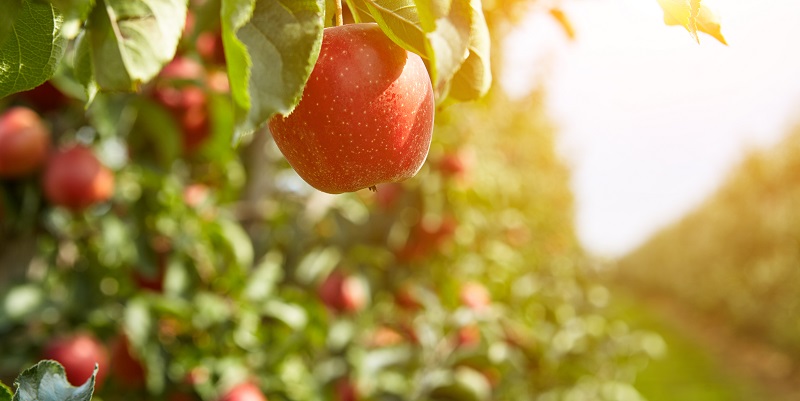Research project
VOICES: Valuing Orchard and Integrated Crop Ecosystem Services
- Start date: 1 May 2017
- End date: 31 January 2020
- Principal investigator: Professor William Edward Kunin (School of Biology)
- Co-investigators: Dr Effie Kesidou (Leeds University Business School) Dr Steven Sait (School of Biology)

Description
Co-investigators:
Post-Doctoral Fellow
Project background
The Cape Floristic Region has a rich mosaic of meso-climate conditions and a great agricultural production potential. However, the region`s potential for superior quality agricultural production has been threatened and will likely to be disrupted with unfavourable climatic conditions due to global warming. Accordingly, sustainability of the apple sector is directly related to its ability to farm smarter and adapt to technological and organisational change. Environmental management practices and technologies can reap substantial benefits for production, but the value of such interventions and its distribution amongst stakeholders may depend on existing organisational capabilities, management skills and structural characteristics.
Research overview
Crops are both a major source of local farm employment and of export earning, but the quantity and (especially) quality of crops produced depends critically on insect pollinators and natural enemies of fruit pests. We will experiment with the use of floral resource plantings on orchards to encourage pollinators and biocontrol agents, further developing the approach to develop bespoke mixes providing temporal and nutritional complementarity to orchard crops. We will also explore the way orchards are managed and the proximity to and interaction with natural fynbos habitats affect the pollination success of the crops and attack rates by pests.
The natural habitats of the Cape region are a world biodiversity hotspot, but the effect of this diversity on pollination and biological control services is unknown, as is the effect of the orchards on their surrounding habitats. We will measure how differences in farm practices and differences in the availability of wild beneficial insects affect fruit production and suitability for export, domestic or processed food (e.g. juice) markets, and thus how it affects crop value and farm economics. We will also look at how the income generated by fruit production is distributed through the local and national economy, and thus the effects of livelihoods and wellbeing. Distinctions in practices and outcomes between large long-established orchards, and those recently established through the BEE (Black Economic Empowerment) programme will be explored, as well as the distinction between resident and seasonal labour forces.
Case Study: Integrated Pest Management (IPM) used in apple production
Since deregulation in 2004, apple fruit production in South Africa (SA) predominantly relies on the ability to produce innovative responses to the climatic changes, changing market demand and production technologies. Producers adopt technological agro-eco-innovations such as Integrated Pest Management practices (IPM) and organisational agro-eco-innovations such as Environmental Management Standards (Eco-labels) to reduce environmental externalities, increase production efficiency, and achieve sustainable competitive advantage.
We aim to understand the extent of Integrated Pest Management (IPM) used in apple production, as well as motivations/barriers and expected/realised benefits of the IPM use. Similarly, we will examine the interacting effects of management, ownership, and landscape context upon production quality, export income, and the distribution of value through rural employment. Finally, this research will examine whether there are potential synergies between components of IPM and other types of voluntary environmental standards (i.e., ISO14001 and ISO5001) and food standards (i.e., GlobalGAP and LEAF) and, the impact of this synergy on firms` labour productivity and export intensity.
We hypothesise that complementary resources are required in order to capture the benefits associated agro-eco-innovations and as a result, firms that bundle certain strategic resources together by adopting two agro-eco-innovations outperform other firms that adopt solely one. This study analyses whether the performance effects of these complementary resources can be enhanced by two-way complementarity between them.
The methodology is based on a novel socio-economic survey collected via face-to-face interviews with 75 apple fruit producers in the Elgin, Grabouw, Villiersdorp and Vyeboom regions of SA.
Key findings
The interaction with orchard owners and managers, and with the pack-house industry, have led to fruitful interchanges about pollination and pest control issues in South Africa's apple and pear industry. These interchanges are on-going, but there has been marked progress in recent months.
As well as this, our findings show that two-way complementarity exists between technological agro-eco-innovations (e.g. IPM) and organisational agro-eco-innovations (e.g. Eco-labels). Farms that adopted both IPM and Eco-labels achieved higher land productivity and export growth compared to farms that adopted them singularly, or none of them.
For an up-to-date list of key findings from the project, visit the UKRI project page.
Contact
Funded by BBSRC. Project reference number BB/P023274/1.


